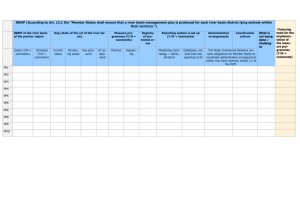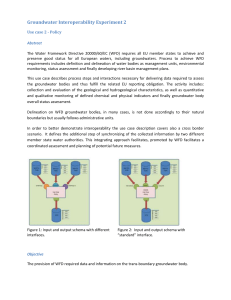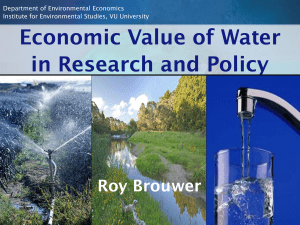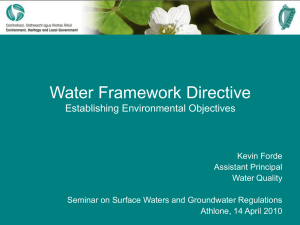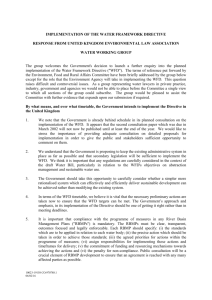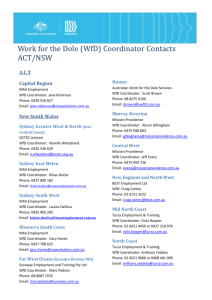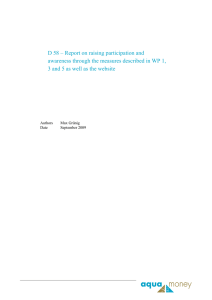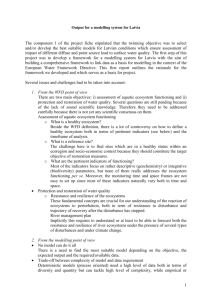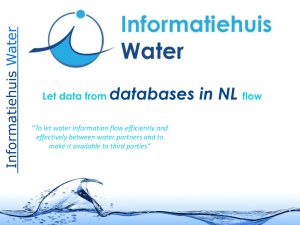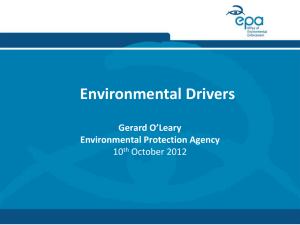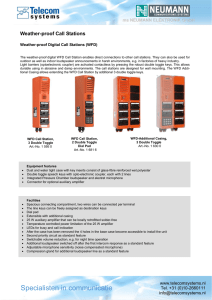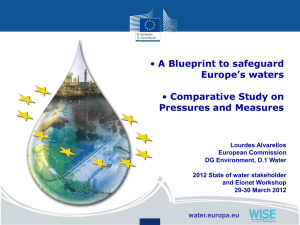WSTG Conference Presentation M OCinneide.
advertisement
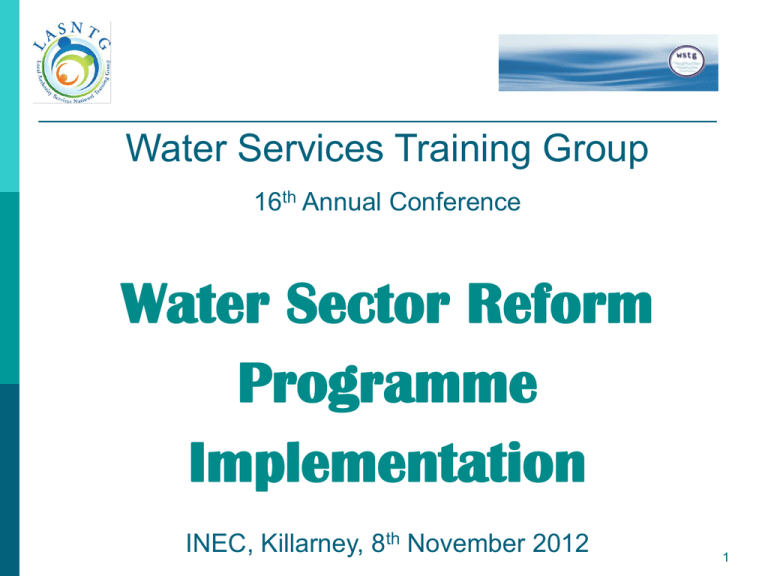
Water Services Training Group 16th Annual Conference Water Sector Reform Programme Implementation INEC, Killarney, 8th November 2012 1 Water Sector Reform Programme Implementation Presentation Title Micheál Ó Cinnéide Director Environmental Protection Agency Achoimre / Outline of Presentation 1. Environmental Regulation – the core role of the Water Framework Directive 2. Roles of EPA in Water Monitoring & Assessment 3. Irish Performance on WFD – results so far.. 4. An Update on Water Governance in Ireland 5. EU – update on Plans & Water Assessments 6. The main Water challenges for Ireland & EU 1. New Landscape for Water Management in Ireland Integrated focus of the Water Framework Directive WFD is a Europe wide Framework for the protection of the biology, chemistry, & natural physical form of all surface & groundwaters and dependent waterbodies. Integration – a core element of Water Framework Directive (CIS Guidance, 2003) WFD aims to achieve Integration of Environmental objectives (Quality, quantity & ecology) All water resources (freshwater, coastal, wetlands) Disciplines & Data (biology, chemistry, hydrology, economics) Legislation (Nitrates, Urban Waste water, Shellfish Regs) Decision making (Local, River Basin, National) Measures (land use, management, pricing) Stakeholders ( Irish water, local authorities, NGOs) So, our WFD approach should reflect this integration ! The Water Framework Directive aims at broad policy integration 2. Current Roles of the Irish EPA in relation to Water Coordinate national programs on WFD, Bathing Water, Drinking Water & Waste Water Monitoring of water Quality (Biology, Chemistry) Monitoring of water Quantity (Hydrometrics) (Integrated) Assessment of Water Data Technical & policy Advice to Government, EU committees Reporting to the EU on Water Quality & WFD Licensing of Industrial plants & Waste Water Discharges Enforcement of Licenses, audits & inspections So, Water is a key focus for the Agency EPA – River Monitoring & Assessment for the WFD EPA Assessment Reports - Causes of Pollution in Rivers, 2007/09 3. Water Quality in Ireland – Reporting Summary Groundwater (EPA data) 85% of groundwater aquifers are at Good status 14% of GW area ‘poor’ due to Nitrogen and Phosphate >35% private wells are contaminated with faecal bacteria Rivers 71% is at High or Good status, 29% river channel is polluted Main cause: ~ 50% due to agriculture /diffuse sources Lakes 42% of lake area is High or Good status 58% of lake area polluted, mainly by Phosphorus Estuarine and Coastal Waters 64% of bays are at High or Good status, 15% polluted Agriculture contributes ~80% N load & 26% P load 4. EPA Review of RBMPs – Report to DoELG, 2010 “The 7 River Basin Plans are good, if Implemented.. “ but We need clear governance arrangements, backed up by legislation, to oversee, coordinate and report on implementation of the Plans. An integrated regional and national approach to deliver the Plans Integrated regional planning at RBD level integration of the monitoring requirements of the EU Directives and national Regulations Structures for integrated inspection and enforcement regime Dialogue & WFD review (DoELG led) ongoing since Spring 2011. Proposed new Water Governance 3 Tier Water Model - based on consultations to date with DECLG and CCMA & is subject to resources 5. Status of adoption of WFD plans, mid 2012 EU Synthesis of policy, building on a series of WFD assessments Comparison of Water Q in Ireland with other countries (based on EEA website data) Starting point and ambition ▌ Exemptions █ Good Ecological Status █ Unknown Ecological Status 6. Challenges for Water Management - Ireland Irish Water - Creating the new utility is a catalyst for change Integration – We need structures to deliver a “fit for purpose” integrated Assessment & River Basin service Networks – Department, EPA, Irish water & Local Authorities need to work together to plan, implement & report on Water Quality management Regulation - We need legislative change to combine the new Governance structures for Irish Water & WFD Funding - Water monitoring, Assessment & Measures will be expensive, core dialogue with CER. Challenge – Maintain our existing water quality An absolute priority: there must be ‘no deterioration’ Average phosphate concentrations in EPA national groundwater monitoring network Challenges for Water Management - Europe EU (DG Environment) is preparing “Blueprint for Water” assessment by November 2012 Their initial view on WFD plans - “its business as usual, dressed up as implementation” Challenges with water quality, quantity & droughts RBD targets for Status improvement by 2015 / 2021 are ambitious, but “lack of ambitions in plans” Public participation & Social Learning in WFD has been patchy & limited Integration of decision making is tough, all across EU
